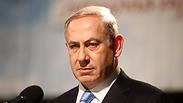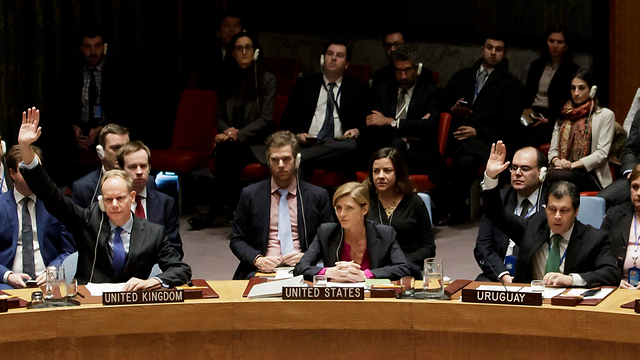
Netanyahu has sown the wind, Israel is reaping the whirlwind
Op-ed: The blow Israel suffered at the UN on Friday will be followed by another blow this week as US Secretary of State Kerry presents his outline for an Israeli-Palestinian peace agreement. If one of the Security Council member states decides to translate this speech into a resolution in the next three weeks, we should expect another drama in New York.
Kerry’s speech will specify parameters and principles אישא are supposed to guide Israel and the Palestinians, including borders based on the 1967 lines with land swaps, a demilitarized Palestinian state, a right of return to the Palestinian state only, and more. This speech—not an anti-settlement resolution—was what the Israeli government has been afraid of in the past few months, vigorously lobbying in Washington and in the international community, including harsh comments made by senior Israeli officials against Kerry and US President Barack Obama.

The speech, from a secretary of state who is about to retire, won’t change much. A source in the White House told me Saturday night that the administration has no intention at the moment of taking any further action concerning Israel. But if one of the member states decides to translate the speech into a resolution that will be voted on by the Security Council in the next three weeks, we are in for another drama in New York. The Obama administration will find it difficult to veto a resolution that echoes comments of the senior member of Obama’s cabinet. The result could be another threat, much worse, to Israel’s standing in the international community.
Prime Minister Benjamin Netanyahu has sown the wind and Israel is reaping the whirlwind.
The blatant language Netanyahu used Saturday evening to respond to the American abstention in the Security Council vote points to the intensity of the blow. “It was a shameful ambush by the Obama administration,” the prime minister said. “A disgrace.” These are words which an Israeli prime minister should not be casting at an incumbent American president, especially as it is unlikely that there is any factual basis for his claim on this case. Netanyahu thinks he can do whatever US President-elect Donald Trump allows himself to do. The frog wishes to become an ox.
President Obama is spending his Christmas holiday in Hawaii, the state he was born in. On Wednesday, he held a conference call from there with Kerry, US Ambassador to the UN Samantha Power, and senior National Security Council officials. The subject was the proposal raised at the Security Council on the settlement issue. The question was whether to veto the resolution or abstain.
As opposed to what has been reported, the American delegation was not surprised by the proposal. Rumors began been circulating several days earlier. Their initial inclination was to recommend a veto, arguing that the proposal was unbalanced. The Palestinian delegation, with a lot of sophistication, managed to moderate the proposal and adjust it to the American policy. The administration says it was uninvolved in the move in any way.
Obama thought it over. A senior administration official I spoke to Saturday night said that the argument that tipped the scales for the president was the Regulation Bill and a series of other statements, made by Netanyahu and some of his ministers, on the settlements. “The past few weeks went beyond anything Netanyahu has ever said before,” the official said. “It went too far. For eight years, the administration has been making a supreme effort to support Netanyahu. Not only has it not worked, it has done the opposite.”
According to the source, the president’s gut feeling was that this time the US should abstain. Nonetheless, he reread the wording several times before making a decision. He reaffirmed the decision the next day, Thursday, when the new version was presented.
Did President-elect Donald Trump’s interference affect the decision? Probably. Trump has been voicing his opinion every night on issues that are under the incumbent president’s authority. This behavior is unusual, but it’s not unprecedented. Richard Nixon, Trump’s role model, acted the same way. The result is two clashing American administrations. Obama fought back: He made a series of decisions establishing facts on the ground, which Trump will have a very hard time changing. A Security Council resolution fits into this policy.
Moreover, the Israeli government, quite insolently, turned to Trump on this issue and got him to pressure Egyptian President Abdel Fattah al-Sisi to withdraw his proposal. White House officials were astonished. They had never dreamed that the governments in Cairo and Jerusalem would work together to thwart a UN resolution against the settlements. Neither had they dreamed that Israel would secretly turn to Vladimir Putin’s Russia to veto a Security Council resolution that the Americans decided to abstain on.
All these amazing tricks ended in total failure. The Egyptians pulled their proposal, but New Zealand rushed to put it back on the agenda. The Russians favored the Arabs over Israel. They have been doing that consistently since the early 1950s. Israel’s courtship of Russia generated a bitter smile on the face of our friends in Washington. Russia, Iran’s ally in the war in Syria, is the Israeli government’s great hope.
The practical meaning of the Security Council resolution is limited. Every three months, a report on the construction in the settlements will be submitted to the council. Someone will suggest imposing sanctions on Israel. The US will veto such a decision. Eventually, the issue will be dragged to the International Criminal Court in The Hague. The US is not a member of that court.
The resolution will have further implications. At the US Congress, proposals will be raised to halt the American aid to the UN and its institutions. Such proposals match the direction Trump is pushing towards and have a good chance of being adopted. Severing ties between the next administration and the UN could change the entire system of international relations. And that is, of course, just the beginning. Trump wants to change the delicate balance between nuclear powers in the world. What an impact will that have?
The Israeli government will be forced to follow in the Americans’ footsteps. The result will be an increased Israeli dependence on America and a smaller chance to improve relations with the oil states and African states. On Saturday, Netanyahu punished Senegal, recalled the Israeli ambassador from New Zealand for consultations and postponed a visit by the Ukrainian prime minister. Big deal. He didn’t recall the ambassadors from Moscow, Beijing, Paris, London or, Heaven forbid, Washington.
The main problem he is facing is internal. The Bayit Yehudi party is demanding that, in response to the resolution, Israel annex Ma’ale Adumim and launch a construction boom in the West Bank. Netanyahu knows that such a decision will only speed up the process that will lead us to a South Africa-style boycott. He knows his voters: They will applaud any aggressive statement, but will get mad once they are required to get a visa for their next flight to watch a Real Madrid-Barcelona soccer match.
Like many Israelis, I am concerned by the expected damages and angry about the mistakes made on the way, about the arrogance, about the foot dragging, about the stalemate. But essence comes first. After 50 years of winking, leading astray, and self-deceiving, the world is trying to tell us, with a majority of 14 versus zero, that the moment of truth has arrived. We cannot continue building settlements and praying for peace at the same time. Both the Amona settlers and the human rights organizations are right about this issue. We cannot keep eating our cake and have it too. The question is not settlements or peace: There will be no peace in the foreseeable future. The question is settlements or the Jewish and democratic State of Israel, which is a member of the international community.
Former Prime Minister Ehud Barak said Saturday that during his term there was four times more settlement construction, and the world congratulated him because at the same time he made an effort to reach an agreement. That is the exact wink that has failed us over the years. “The resolution,” Netanyahu’s spokespeople said Saturday, “sabotages the negotiations.” Which negotiations is it sabotaging, if there are no negotiations?
Netanyahu is relying on Trump. He may be right: Trump will solve all his problems. He should just remember that in Trump’s world there is only one Trump. If he refers to Trump as he referred to Obama, he will suffer a much heavier blow than the one he suffered at the Security Council over the weekend.











